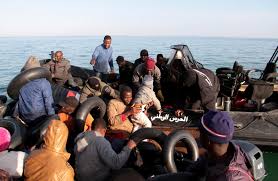In Tunisia, migrants with their sights set on Europe wait
EL AMRA: For months, thousands of migrants from sub-Saharan Africa have gathered in Tunisian olive orchards, living in improvised tents and subsisting on few provisions in the hopes of making it to Europe.
Humanitarian sources report that some 20,000 people are in remote locations close to the villages of El Amra and Jebeniana, which are between 30 and 40 kilometers (19 and 25 miles) north of the coastal city of Sfax.
historically served as a center for sub-Saharan migrants traveling by boat to Europe.
Following their forced expulsion from the city in the fall of last year, migrants camped out in nearby towns, waiting to attempt the treacherous crossing.

One worn-out 17-year-old identifying as With the intention of crossing the Mediterranean “to provide for his sick mother and little brother” back home, Ibrahim told AFP he had left Guinea more than a year ago.
He indicated that he arrived in El Amra in midwinter, or around three months ago, having walked for three weeks from the Algerian border.
He said, “It’s really difficult here,” and mentioned that he and other migrants felt excluded from society.
“Even when we shop, we have to keep everything covert.
“You can go out looking for work, but when it’s time for your employer to pay you, they would call the police,” he said.
Anti-immigration violence erupted last year after President Kais Saied said in a speech that “hordes of illegal migrants” presented a demographic danger to Tunisia, forcing hundreds of sub-Saharan Africans out of their homes and places of employment.
Sfax is the nearest European nation, therefore in 2023, tens of thousands of people left the country.
About 150 kilometers away, on the island of Lampedusa, Ibrahim said, “We are only a few kilometers from Europe.”
– “We made it through” –
Tents erected from tarpaulins and poles near El Amra house sleeping quarters shared by groups of five, sometimes ten people.
Grouped by language are men, women, and children, mostly from Cameroon, Guinea, Nigeria, Senegal, Sierra Leone, and Sudan.
While men pluck the feathers off inedible-looking but necessary bony hens, women prepare stew.
According to Ibrahim, the winter “was very cold, but we managed to survive thanks to the solidarity we have as African brothers”.
“If someone has food and you don’t, they give you some,” he said.
“We used our money, which our relatives were able to send them, to purchase the tarpaulins, or we begged.”
Earlier in April, over 7,000 migrants got food aid from NGOs for the first time in months. However, they said this was insufficient and demanded more assistance from Europe, which has increased its efforts to stop irregular migration.
The North African nation “is turning into a de facto detention center because of border control agreements signed with the European Union,” said Romdhane Ben Amor, spokeswoman for the Tunisian nongovernmental organization FTDES.
One of the main concerns of the encampments is hygiene.
Ibrahim said, “There have been a lot of illnesses and births.”
According to a humanitarian source who spoke with AFP, a hospital in Jebeniana has been seeing one migrant birth every day in recent weeks.
Salima, 17, said that since she was out of diapers for her four-month-old child, she was forced to use plastic bags.
Salima told AFP she was still determined to make the trip, even though she was waiting for the beginning of departures for Europe, which had been delayed due to severe weather.
“Weary of the cops” –
After neighbors purportedly reported thefts, Tunisian police stormed numerous encampments lately, driving out some migrants and burning down tents.
AFP journalists saw damaged tents, bulldozers, and used tear gas canisters close to Jebeniana; part of the tents had already been rebuilt.
“We’re very tired of the police,” said 22-year-old Sokoto, who went under a pseudonym and came via Algeria in January after fleeing Guinea three years before.
He said, “Just yesterday, I was chased from shops” in El Amra.
El Amra resident Mohamed Bekri said that he often provides food and water to the migrants for “humanitarian” purposes.
“There are babies who are three and six months old,” he said.
None of the migrants that AFP spoke with expressed a desire to go back to their home countries, despite the tensions and the terrible circumstances they find themselves in.
“The gearbox in reverse is broken,” Sokoto said. “Even if I have to swim across the sea to get to Europe, I won’t go back to Guinea; I left to support my family and I suffered a lot to get here.”







